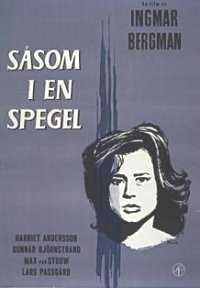In Ebert's book, Ingmar Bergman's first Trilogy is one entry, divided up into a few smaller essays. He put it with the other "B" movies in the alphabet, so I'm watching them as such. I think I'll try to do something similar and make some shorter posts on each of these films, instead of one big post about all of them.
Today at work my co-workers took me and another co-worker out for a combined birthday lunch, which was actually sort of fun. I work at a non-profit that helps adults with developmental disabilities, and after we ate, all of the participants who work in our restaurant came out to sing happy birthday to us. :) It pretty much made my day.
I came home to watch Bergman's Through a Glass Darkly. I personally found it almost the most accessible of any Bergman I've watched so far. Like, if someone wanted to watch Bergman movies and didn't know where to start, I'd recommend this one. There are other Bergman movies I've watched that may be better, but this one is a great example of his visual style and strange plots without being quite so difficult to follow.
The film is about Karin, a young woman who is on vacation with her brother, husband, and father after spending time in a mental hospital. Her grip on reality starts to loosen, hastened by a discovery she makes when rifling through her father's things one day. She often hallucinates, and thinks she is being visited by God, who is a spider. As Karin suffers more and more, the relationships that her family members have to each other suffer as well.
I really liked the movie, but I'm still learning a lot about Bergman and my thoughts about this film are far from technical. I liked that the plot was in many ways more accessible than some of his others. It was easier to relate to the characters, and just to follow the basic story. It was less abstract, basically, than something like The Seventh Seal. For someone new to Bergman like I am, I found it more engrossing and easier to watch. I didn't feel like it required as much of me, if that makes any sense. I felt more like I could just watch the movie, and less like I had to puzzle it out. e explain that it is important. The shot is basically two faces on the screen, often physically close, but lit differen
I loved that it wasn't dumbed down, though. It still had the amazing visuals that I love Bergman for. Lots of closeups of faces - and Karin is often staring. It must have been a very demanding role for her. Ebert writes a lot about the cinematography in his essay, which I found really educational. I still feel like I don't know much about this director, and I really valued Ebert's great essay. I found his description of Bergman's famous "two-shot" really interesting. I noticed it in the film, but it was nice to have someone explain that it is important. The shot is basically two faces on the screen, often physically close, but lit differently (from different light sources) and are often not looking at each other. It shows that the characters are not able to connect with each other, that people are just too different.
As much as I sometimes struggle though Bergman, I like watching his movies. I love the style. Ebert says that each scene could be a still image, and I agree - there is little difference between artistic photography and a Bergman film. Each shot has so much...purpose. I remember in film class we were often told that nothing in movies is accidental. It's never "over-analyzing" to think about why a suitcase is red because someone made a choice to make it red, and therefore, it was on purpose. Through a Glass Darkly is like this, but even more so! You don't get the impression that anything was just decided on with vague interest. Everything just exudes care and attention. The lines in the background are there because they mean something. The wallpaper pattern was chosen because it is symbolic and an allusion to "The Yellow Wallpaper," a short story. I could keep going. I sometimes am not in the mood for a movie like this, one where every shot has deep meaning, but I liked it and I respect it. I can just feel the hard work and genius that went into making it. It's also fun, on occasion, to sit and scour over the film, looking for symbols and different ways to interpret things.
I know Bergman can be polarizing for some people - it seems you either really like him, or you really just hate his style - but I like it. I think if you are interested in Bergman, Through a Glass Darkly might be a great place to start. It was easier for me to watch than some other films of his that I have seen, because the plot is less complicated, giving you time to focus on his style and depth. I sort of wish it was the first Bergman I saw, but I'm happy to have seen it now. He's a great director, and I generally have enjoyed all of his films. They might not be the easiest to watch, but I can't help but be drawn into them.
Have any thoughts on Through a Glass Darkly? Share them in the comments!
Links:
Ebert's Great Movie Essay on Through a Glass Darkly
Buy it on Amazon

No comments:
Post a Comment